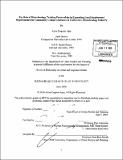| dc.contributor.advisor | Paul Osterman. | en_US |
| dc.contributor.author | Agia, Aziza Eugenie | en_US |
| dc.contributor.other | Massachusetts Institute of Technology. Dept. of Urban Studies and Planning. | en_US |
| dc.coverage.spatial | n-us-ca | en_US |
| dc.date.accessioned | 2010-10-29T18:23:50Z | |
| dc.date.available | 2010-10-29T18:23:50Z | |
| dc.date.copyright | 2010 | en_US |
| dc.date.issued | 2010 | en_US |
| dc.identifier.uri | http://hdl.handle.net/1721.1/59725 | |
| dc.description | Thesis (Ph.D.)--Massachusetts Institute of Technology, Dept. of Urban Studies and Planning, 2010. | en_US |
| dc.description | Cataloged from PDF version of thesis. | en_US |
| dc.description | Includes bibliographical references (p. 383-390). | en_US |
| dc.description.abstract | This study addresses a gap in the policy and planning literature regarding the extent to which public workforce intermediaries in a knowledge-intensive industry expand employment opportunities for a nontraditional, i.e., less-educated or displaced workforce. Specifically, it investigated the recruitment and hiring practices for entry-level biomanufacturing and biological technicians among a sample of life sciences companies in the San Francisco Bay Area and the Greater San Diego Area in order to determine whether training partnerships composed of community colleges, employers and public agencies shape labor supply and demand in favor of community college graduates. The study also examined the mechanisms through which such intermediaries influence recruitment and hiring practices, focusing on strategies to encourage employers' active engagement in the partnership and to facilitate extensive collaboration among key partners. To measure impact on industry practices, I gathered from a treatment and comparison group of firms the percentage of technicians in the current entry-level workforce that holds a community college degree or certificate. To determine the factors associated with successful (or unsuccessful) program intervention in the sample firms' recruitment and hiring practices, I conducted qualitative interviews of company staff regarding the education and training needs of the company with respect to its technician-level workforce, as well as the company's perceptions of its community college hires vis-A-vis their bachelor-degreed counterparts. The evidence shows that, among companies employing a bio-manufacturing workforce, the programs have succeeded in training future technicians to meet the needs of area employers (a supply-side goal); and in negotiating skills-based, as opposed to credential-based hiring, while legitimating the community college population as a viable candidate pool (both demand-side goals). The evidence is mixed with respect to the programs' ability to increase graduates' access to entry-level employment in the research laboratory setting. Finally, the evidence shows that partnership efforts produce industry-relevant curriculum, training, and services; facilitate the learning necessary to generate program innovation; and establish relationships of trust with company staff. Together, such outcomes positively shape the opportunity structure facing community college job seekers. | en_US |
| dc.description.statementofresponsibility | by Aziza Eugenie Agia. | en_US |
| dc.format.extent | 390 p. | en_US |
| dc.language.iso | eng | en_US |
| dc.publisher | Massachusetts Institute of Technology | en_US |
| dc.rights | M.I.T. theses are protected by
copyright. They may be viewed from this source for any purpose, but
reproduction or distribution in any format is prohibited without written
permission. See provided URL for inquiries about permission. | en_US |
| dc.rights.uri | http://dspace.mit.edu/handle/1721.1/7582 | en_US |
| dc.subject | Urban Studies and Planning. | en_US |
| dc.title | The role of biotechnology training partnerships in expanding local employment opportunities for community college graduates in California's biotechnology industry | en_US |
| dc.type | Thesis | en_US |
| dc.description.degree | Ph.D. | en_US |
| dc.contributor.department | Massachusetts Institute of Technology. Department of Urban Studies and Planning | |
| dc.identifier.oclc | 669054019 | en_US |
